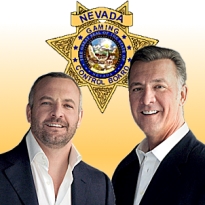 Fertitta Interactive has applied to the Nevada Gaming Control Board for an online poker operating license. Owned by Frank and Lorenzo Fertitta (the force behind Station Casinos and the UFC), Fertitta Interactive is just the third company (after South Point Poker and Monarch Gaming) to ask Nevada for more than just the right to supply technology to some other operator. Two weeks before Black Friday, Fertitta had entered into a joint venture partnership with Full Tilt Poker to launch a US-facing online poker site if/when the feds made such activities legal. That deal unraveled following the DoJ’s April 2011 actions, but Fertitta bounced back in October by acquiring online gaming software outfit CyberArts. Lorenzo Fertitta said “Nevada has always been the leader in gaming regulation and we’re pleased to file our application here. Our goal is to provide customers with the best online gaming experience in a safe and well-regulated online environment.”
Fertitta Interactive has applied to the Nevada Gaming Control Board for an online poker operating license. Owned by Frank and Lorenzo Fertitta (the force behind Station Casinos and the UFC), Fertitta Interactive is just the third company (after South Point Poker and Monarch Gaming) to ask Nevada for more than just the right to supply technology to some other operator. Two weeks before Black Friday, Fertitta had entered into a joint venture partnership with Full Tilt Poker to launch a US-facing online poker site if/when the feds made such activities legal. That deal unraveled following the DoJ’s April 2011 actions, but Fertitta bounced back in October by acquiring online gaming software outfit CyberArts. Lorenzo Fertitta said “Nevada has always been the leader in gaming regulation and we’re pleased to file our application here. Our goal is to provide customers with the best online gaming experience in a safe and well-regulated online environment.”
With the District of Columbia looking like its headed in reverse on the online gambling regulation front, Nevada is clearly the nation’s front-runner in the online poker sweepstakes. (For the record, the American Gaming Association felt compelled to tell Gambling Compliance that, despite Council member Michael A. Brown’s allusions to the contrary, the AGA had no hand in foiling DC’s plans. The AGA’s members, on the other hand…) Regardless, Nevada’s front-runner status hasn’t stopped other states from running. On the last day of January, California state Sen. Rod Wright re-filed his SB45 online gambling bill with Senate authorities. And we’re off…
California hosted the Western Indian Gaming Conference this week, where anti-Nevada talk was all the rage at the panels discussing online poker legislation. Several panel speakers voiced the opinion that while Black Friday had removed the international companies that were the principal drivers of federal online poker legislation, the void caused by their absence had left Nevada “driving the bus.” If tribes didn’t want to end up at the back of that bus, they needed to get their act in gear.
Tom Brierton, attorney for the California Online Poker Association, warned that federal legislation designed by Sen. Harry Reid (D-NV) would likely include an opt-out provision that would present states with a lose-lose choice: accept federal oversight of online poker, or opt out of offering online poker altogether. “Those are two bad choices for California, but that is what the Nevada camp wants.” (Last August, as part of a campaign to promote state Sen. Lou Correa’s SB40 intrastate poker bill, COPA ran TV ads that contained the pitch “Don’t give our money to Nevada!”)
In Connecticut, representatives of the Mohegan and Mashantucket Pequot Tribes testified before the state legislature’s Public Safety Committee as to their willingness and capacity to handle the state’s online gambling plans. The tribes, which already run the state’s immensely profitable casinos, aren’t entirely in lockstep on their approach, with the Mohegans preferring to limit any online offering to poker only, while the Mashantucket Pequots want to offer a full suite of casino games. Both tribes are adamant that leaving them out of any online gambling system would violate their compact with the state.
But Connecticut lawmakers appear to be backing away from their earlier support of online gambling. Committee co-chair Rep. Stephen Dargan said the “leadership … has no thought of introducing any bills with online gaming because we are in the infancy stage of trying to understand this issue.” Elsewhere, Gov. Dannel P. Malloy inexplicably described online gaming as a “discussion item” around which there was “not a lot of excitement,” and thus the likelihood of his proposing an online gambling bill was “highly unlikely.” Senate Republican leader John McKinney couldn’t conceal his delight at Malloy’s flip-flop. “I don’t believe that putting a 24/7 electronic casino in every house in Connecticut so the government can profit from it is the way to solve our budget crisis.” Memo to McKinney: when you’re running a massive deficit (nearing $150m, at last count), there are no profits. Just sayin’…